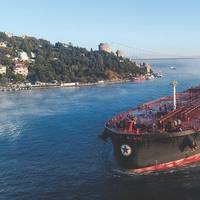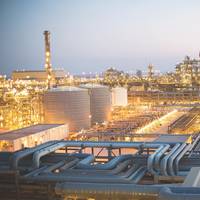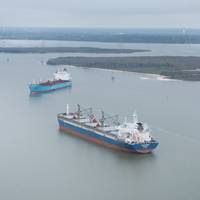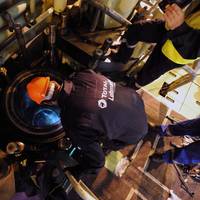Total Lubmarine's Talusia Universal Gains NOL from WinGD
Total Lubmarine’s Talusia Universal (BN57) has received a No Objection Letter (NOL) from WinGD for all fuels (liquid and gas) with a sulphur content 0.00%S - 1.50%S.The NOL was awarded with no restrictions following the successful completion of two rigorous tests carried out on two different vessels fitted with W6X72 engines.The tests were conducted on split engines comparing Talusia Universal with a BN40 reference Cylinder Lube Oil (CLO). One test carried out with compliant VLSFO <0.5%S, the other one with compliant ULSFO <0.1%S for 2350 and 2000 running hours respectively.“Following both tests, Talusia Universal performed significantly better than the reference CLO for deposit control and general piston cleanliness…
Fuels, Lubricants & Green Marine

International Maritime Organization (IMO) fuel rules entering force in 2020 mandate a drastic sulfur reduction. By 2050 the mandate is to cut greenhouse gas emissions of shipping by at least 50 percent.Marine fuels, lubricants and additives manufacturers play their part in establishing maritime’s green credentials by introducing new environmentally acceptable technologies and products.The shipping industry is more than ever portrayed in a bad light due to increasing awareness of its contribution to global climate change, according to Dirk Kronmeijer, CEO of GoodFuels Marine.
IMO 2020: The Future of Fuel

There has been little reaction by way of statements or position papers from marine fuel lubricant manufacturers to the IMO MEPC70 proposals for a global fuel sulfur content cap of 0.5 percent by 2020 but they are fully aware of the implications of the proposed regulations and are taking what could be termed a ‘pragmatic approach’ to fuel regulation compliance. Marine lubricant suppliers have avoided getting involved in the debate as to whether the IMO MEPC70 proposals to reduce permissible marine fuel sulfur content to 0.5 percent or less is good…
Op/Ed: Shiphandlers Beware

Was the closing of the Houston Ship Channel for over three days in March 2015 due to the use of Ultra Low Sulphur Fuel Oil (ULSFO)? After reviewing the testimony, and evidentiary material presented by the National Transportation Safety Board (NTSB) regarding the 2015 Conti Peridot’s collision with the Carla Maersk, it is the authors' opinion the report fails to address significant contributing factors. The NTSB has overlooked a serious threat to vessel operations throughout the world.
New Total Lubmarine Head Shares His Vision

Robert Joore, the new General Manager of marine lubricants supplier Total Lubmarine, has laid out his vision for the company, focusing on developing a range of innovative solutions for ship operators operating in poor freight markets in a low-sulphur era. Speaking at the company’s headquarters in Paris, Joore said, “Total Lubmarine believes that innovation is the key to success. In 2017 we will continue to invest heavily in developing a generation of marine lubes which are suitable for engines running both low and high sulphur fuels.
Total Lubmarine Launches Talusia Optima
Lubricants supplier Total Lubmarine has launched Talusia Optima, a new cylinder lube oil compatible with high sulphur heavy fuel oils and ultra-low sulphur distillate fuels. According to the manufacturer, the new lube has been developed to simplify the management of vessels trading globally in and out of Emission Control Areas (ECAs), and offers the potential to reduce lube consumption and help extend engine life. Talusia Optima is suitable for use with fuels ranging in sulphur content of between 0 and 3.5 percent. Talusia Optima has received a no objection letter from major OEM Winterthur Gas & Diesel (WinGD) for the use of the product across its two-stroke engine ranges.
Total Talusia Optima Receives Approval From Win GD

Lubricants supplier Total Lubmarine has received a no objection letter from Winterthur Gas & Diesel (WinGD) for the use of its cylinder lubricant Talusia Optima with the whole range of Wärtsilä engines. Talusia Optima is a new cylinder lube oil (CLO) suitable for use with fuels ranging in sulphur content from 0-3.5 percent. The product is currently being tested on a range of ships and is expected to be brought to market later in 2016. Talusia Optima completed over 4,300 hours of validation tests on-board a mega boxship deployed on Asia-Europe liner routes.
Castrol Challenges Scavenge Drain Oil Analysis Methodology
Concerns over corrosive wear risk in cross-head engines led Castrol Marine to question the rigour of some widely used scavenge drain oil analysis (SDA ) techniques. Factors influencing scavenge drain oil characteristics include fuel sulphur level, cylinder oil BN level, system oil contamination and operating profile. Accuracy is critical in SDA interpretation, not least because it supports feed-rate assumptions that are critical to cylinder oil performance, Castrol said. “It is not possible to analyze results accurately without comprehensive knowledge of the fuel oil, the new and used system oil, feed rates and operational data collected from the engine at the time of sampling,” said Paul Harrold, Castrol Marine Technology Manager.
Castrol, MAN, Sing Off Same Lube Oil Song-sheet
MAN Diesel & Turbo supports Castrol’s advice that misapplication of mid-range base number (BN) cylinder oils can cause corrosion. Castrol inform that the engine manufacturer recently issued service letters that recommend “cylinder lube oil with 70BN or higher” for latest generation super long stroke engines using higher sulphur fuel (above 1.5%-2%). MAN says it “cannot recommend” cylinder oils “with a BN level between 50 and 60” for these engines. Ship-owners have been persuaded to try a host of new mid-range lubricants on the basis that they offer a solution across the range of sulphur content in fuel oil, including during slow steaming operations.
Air Emission Regulation Update

In March this year, The U.S. Environmental Protection Agency proposal to designate waters off the North American coasts as an Emission Control Area was adopted by IMO, the International Maritime Organization. The North American ECA is a key part of a comprehensive EPA program to address harmful emissions from large ships. Which are the time schedules of upcoming emission regulations? How are marine engine manufacturers preparing for the tighter air emission limits being adopted? Henrik Segercrantz explores.
Marine Innovations
In extending its adherence to delivering cost-efficient and safety driven technologies, DNV has introduced a new means of quickly and accurately determining steel thickness can speed ship surveys. It is especially valuable in inspecting old and corroded steelwork. Present-day methods, based on ultrasonic thickness measurements, are said to have dubious reliability on heavily corroded plates, and for large vessels are also considered too slow. The basic technological challenge was to transmit 100 percent of the signal energy through corroded steel plates, and receive and interpret the reflected signal to give an accurate thickness measurement. The basic principles of the new measuring method (half-wave resonance) have been known for 40 years.
CIMAC to Focus on Engines and Cylinders
It is estimated that 80 to 90 percent of world trade in volume terms is carried by vessel. There are approximately 86,000 ocean going merchant ships over 100 gt in operation. About 97 percent of them are propelled by large-bore, highly supercharged diesel engines. State-of-the-art diesel engines with maximum availability have to be reliable, maintenance-friendly, highly efficient, and they have to operate at lowest emissions. Cylinder condition is a very important item in diesel engine technology and development. Therefore CIMAC has chosen the topic: Interaction Between Engine Design, Cylinder Lube Oil Dosage, and Cylinder Condition. This type of CIMAC event has been held with great success for several years at major trade fairs like SMM, EUROPORT and ASME Turbo Expo.





